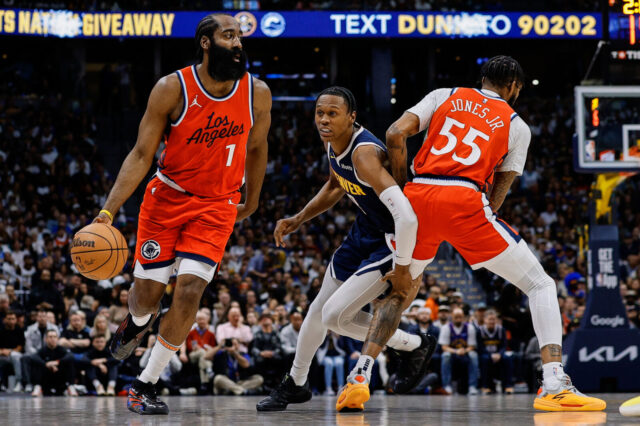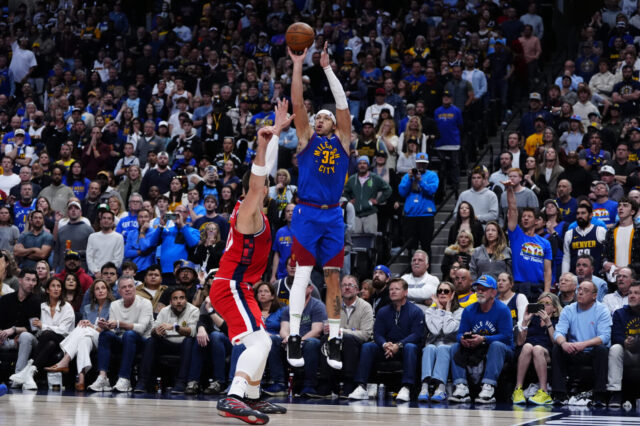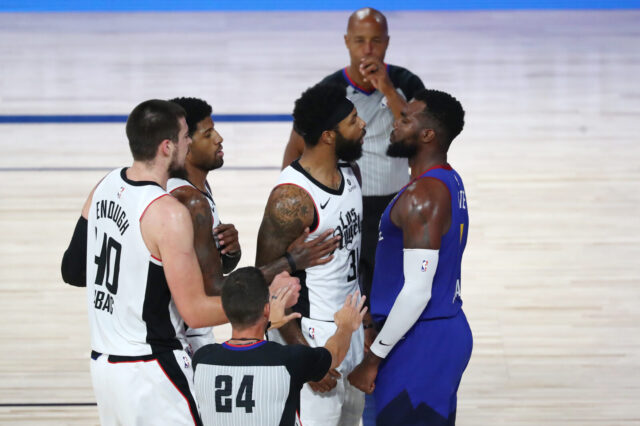Continuing the series on head coaching candidates for the Denver Nuggets, today let’s look at Ettore Messina, the Spurs assistant coach and one of Europe’s most famous and well respected coaches.
Experience
Ettore Messina is on the short list of most famous and well-respected European coaches of the last decade. He coached Virtus Bologna nine seasons in two separate stints between 1989-1993 and again from 1997-2002. The team won four Italian league championships and two Euroleague championships, one in 2001 behind star player Manu Ginobili. In between his two stints with Bologna he took over as head coach for the Italian national team, leading them to the championship game in 2007 where they lost to the much more talented Yugoslavian team. He left Bologna in 2002 for Benneton Treviso where he replaced Mike D’Antoni.
In 2005, he joined Euroleague powerhouse CSKA Moscow, then owned by Mikhail Prokhorov. It was with CSKA Moscow that he achieved perhaps his greatest successes, making it to the Euroleague finals four straight years in a row, winning championships in two of those four seasons. Considered to be the best coach in Europe, Messina left CSKA for Real Madrid. However, in two seasons in Spain, Messina was unable to replicate the success that he had in Italy and Moscow. After two failed seasons with one of Europe’s most famous teams, Messina stepped down.
He made his first foray into the NBA in 2011 when he joined Mike Brown’s coaching staff with the Lakers. After one season in L.A. he returned to CSKA Moscow and led them back to the Euroleague semi-final where they lost by one point after a heartbreaking collapse to Macabi Tel-Aviv, a team coached by Cavaliers head coach David Blatt. A few months after that game, Messina joined the San Antonio Spurs as an assistant to Greg Popovich.

Style
European coaches are known for being authoritative and unassailable which is one of the reasons that NBA teams have shied away from looking to Europe for coaching prospects. Messina seems to be no exception. He has a strong personality and, at least in Europe, was a tough coach to play for. He famously cut several of Real Madrid’s star players upon arrival, electing to go with players that he felt were more malleable.
His teams found success behind their defensive, although it should be noted that the difference between NBA and European basketball is most different on the defensive end. The use of zones and other rule differences make that aspect of the game a bit difficult to gauge. Messina’s teams also play a relatively slow pace by most European standards, preferring an efficient half court offense that plays through the post.
Messina shared several insights into his belief about the X’s and O’s in an article he published online. It reads like a manifesto of sorts. In it he states that one of the most important things that he focuses on throughout the course of a season is getting his players to learn to read the defense.
Our players must be able to read the defensive behavior of their opponents. Any offense can be original, but if the player on offense is not able to understand what the defense does, he loses effectiveness and our offense slows down.
He also states that his teams needed a minimum of 20 FGAs per game from the post. He talks about how the team should constantly look for opportunities to get the ball to the Center, where the defense is most forced to react. Messina is known for his development of post players and it seems clear from that article that he values low post players quite a bit. That isn’t to say that he only focuses on scoring from the post. His diagrams are full of all types of plays and the emphasis on getting the ball into the post seems more like “step 1” rather than the end goal. In a separate interview while with the Lakers, he talked about the importance of floor balance and ball movement.
His tutelage under Greg Popovich has almost certainly given him an interesting and insightful perspective of coaching at the NBA level. While Popovich is known for being one of the most stern coaches in the NBA, he still knows that it is a player’s league. Messina took note of Pop’s unique coaching style in a blog post earlier this season saying that Pop “pushes his coaching staff to argue with him.” Messina went on to say that Pop values input from players as well. It is hard to think of anyone better for Messina to learn from than coach Pop.
Adam’s Opinion
There is a temptation among NBA fans to value mystique. College prospects lose their mystique early, often getting hyped, psychoanalyzed and then destroyed by fans and media members while foreign prospects arrive in the NBA unknown and unscathed. With Messina, there’s much more mystique than substantive evidence that we can point to and say, "this is who he is." Simply put, we just don’t know for certain what type of coach he will be.
He certainly won’t win drawing from the same manifesto that carried him to the highest successes in Europe. While his record with 3 different Italian teams and a Russian team is impressive, his failure with Real Madrid is worrisome. He blames part of his failed experience to a conflict with management. He insisted that the team needed to pace their rebuild. Ownership wanted the team to compete right away.
Blatt is one of our only examples of a coach that made his name in Europe before transitioning to the NBA and while the Cavs have looked impressive lately, Blatt’s learning curve has proven very steep. The Cavs entered the season with plans to install a “borderline genius” offense only to have scaled back quite a bit, relying heavily on the incredible play of Lebron James. Messina will likely have a similar experience, learning that most of what he plans to do as a coach will get scrapped and he will be forced to reinvent his schemes and methods on the fly. His greatest challenge will be how well he can adjust but unlike Blatt, Messina won’t have Lebron to lean back on.
For all of the concerns, Messina seems to have a healthy perspective of the challenge ahead of him. While he coached with an iron fist in Europe, he speaks openly about his need to adjust. And unlike Blatt, Messina has been willing to become an assistant coach in the NBA first. He’s been fairly humble in his comments about wanting and needing to learn the ropes first. It is entirely possible that Messina is studying under Popovich to find the perfect blend between his own affinity and obsession over X’s and O’s with the NBA style leadership of one of the leagues greatest leaders of all time.
As we’ve discussed, the Nuggets appear to have developed a strong European scouting network and Messina’s experience would make him an ideal candidate in that regard. The roster as currently constructed doesn’t appear to be ready to compete and Messina could perhaps spend his first year without lofty expectations. At 55 years old, Messina’s could be the type of diamond in the rough that the organization needs to build stability. Or he could be a total bust.
In short, Messina represents a gamble, and therefore I am not sure if Josh Kroenke will give him much thought. Barring an interview with Josh that totally blows him away, I think that Messina is probably not worth the risk.
This content is no longer available.



